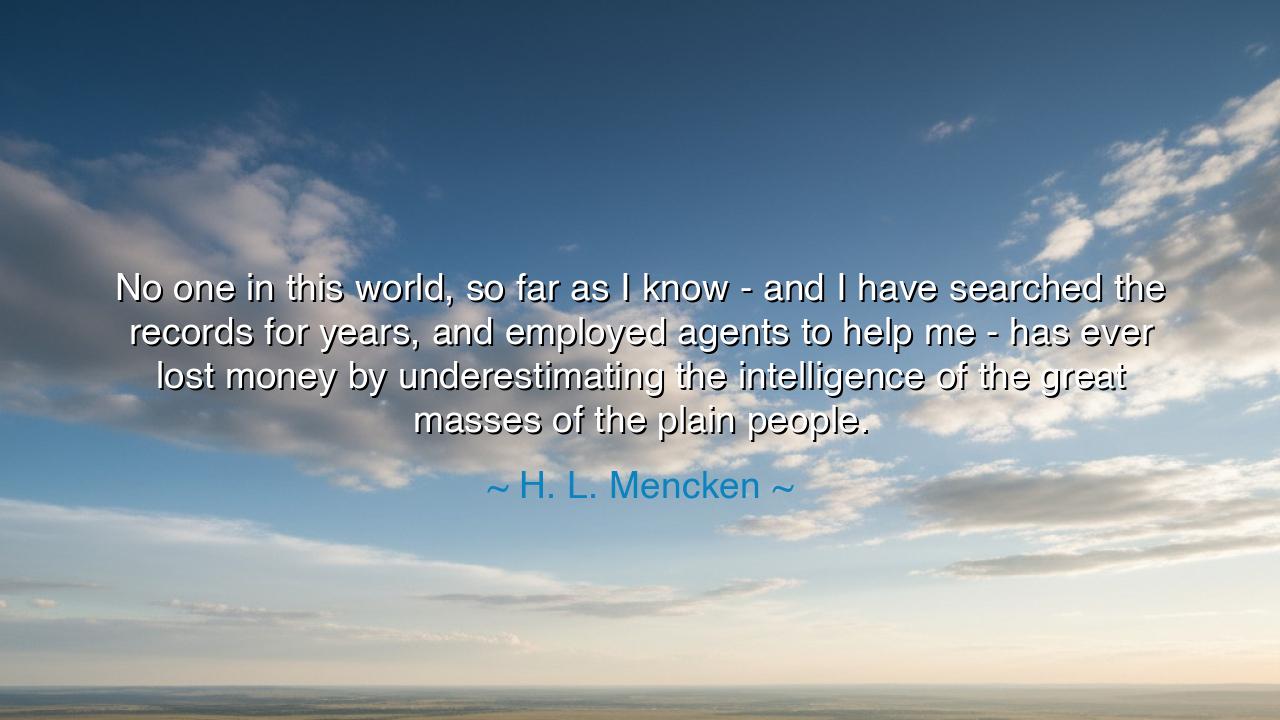
No one in this world, so far as I know - and I have searched the
No one in this world, so far as I know - and I have searched the records for years, and employed agents to help me - has ever lost money by underestimating the intelligence of the great masses of the plain people.






“No one in this world, so far as I know — and I have searched the records for years, and employed agents to help me — has ever lost money by underestimating the intelligence of the great masses of the plain people.” Thus wrote H. L. Mencken, the fierce and sardonic critic of the modern age, whose pen cut through hypocrisy like a blade through silk. Beneath the sharp wit of his words lies a truth both unsettling and timeless: that human folly, especially in crowds, is one of the oldest forces in civilization — as predictable as the tides, and as easily exploited by those who understand it. Mencken, ever the skeptic of mob sentiment, warns that the cunning have always profited from the credulous, and that the tragedy of mankind is not ignorance alone, but the willingness to remain ignorant.
To understand this quote, one must understand Mencken himself — a man of intellect and fire who lived through the roaring chaos of early twentieth-century America. He witnessed the rise of sensationalism in the press, the fever of political demagoguery, and the growing spectacle of entertainment that replaced thought with emotion. From his vantage, he saw that those who shaped public opinion — advertisers, politicians, and showmen — did not appeal to reason, but to instinct, fear, and desire. He saw that the masses, hungry for comfort and simplicity, would more readily follow the voice that promised them easy truths than the one that demanded they think.
Thus Mencken’s words are not merely cynical; they are a mirror held before the human condition. The “plain people”, as he calls them, do not lack intelligence by nature — rather, they surrender it. They exchange curiosity for convenience, wisdom for comfort, and independence for belonging. They prefer the glittering illusion to the hard stone of truth. And those who recognize this weakness — the clever, the ambitious, the ruthless — can build empires upon it. It was so in Mencken’s time, and it remains so today. For history has shown, again and again, that the masses will often cheer the very powers that enslave them.
Consider, for instance, the rise of P. T. Barnum, the master of spectacle in the nineteenth century. His circus dazzled millions, his sideshows fooled even the skeptical, and his coffers overflowed with the coins of the curious. When critics accused him of deceit, he merely smiled and said, “The public appears to like to be humbugged.” He understood what Mencken later articulated: that the merchant who flatters the crowd’s vanity will always prosper more than the teacher who challenges it. Barnum’s fortune was built not upon truth, but upon the crowd’s love of illusion — the very tendency Mencken saw as the soft underbelly of democracy itself.
Yet, though Mencken’s tone is cutting, his warning need not lead us to despair. For in exposing the weakness of the many, he also calls forth the strength of the few. If the masses can be swayed by deceit, then the thinker must be steadfast in discernment. If the crowd is driven by appetite, then the individual must be anchored in reason. Mencken’s words are a challenge — to rise above the easy currents of opinion, to refuse the comfort of conformity, to think when others merely react. For while the clever profit by underestimating the public, the wise ennoble themselves by refusing to do so.
In his own time, Mencken saw how propaganda could turn the masses into instruments of power. He watched as wars were waged not through weapons alone, but through persuasion — slogans, fears, and half-truths that turned neighbor against neighbor. The lesson he leaves us is clear: the health of any civilization depends not upon the brilliance of its leaders, but upon the vigilance of its people. When the public ceases to question, when they trade their reason for spectacle, they become as clay in the hands of those who mold them.
And so, my children, take this wisdom to heart. Do not be counted among those who can be bought by flattery or fooled by noise. Train your mind as a sword, your judgment as a shield. When the world offers you easy answers, look deeper; when it tempts you with shining distractions, turn instead toward truth. Let your intelligence not be the kind that fades in the crowd, but the kind that endures in solitude. Remember always that freedom is not given — it is guarded by thought.
For in the end, Mencken’s warning is not merely against folly, but for integrity of mind. The world will always have those who profit from ignorance — the deceivers, the demagogues, the merchants of illusion. But the greatness of a people lies in their refusal to be deceived. Be therefore as explorers of truth, seekers of clarity, guardians of wisdom. For though it may be easy to underestimate the multitude, it is far nobler to awaken it. And the one who keeps his mind awake — even when all others sleep — is the truest conqueror of all.






AAdministratorAdministrator
Welcome, honored guests. Please leave a comment, we will respond soon